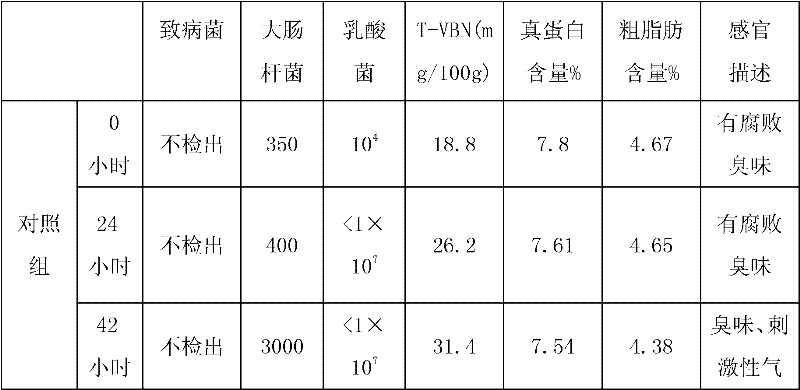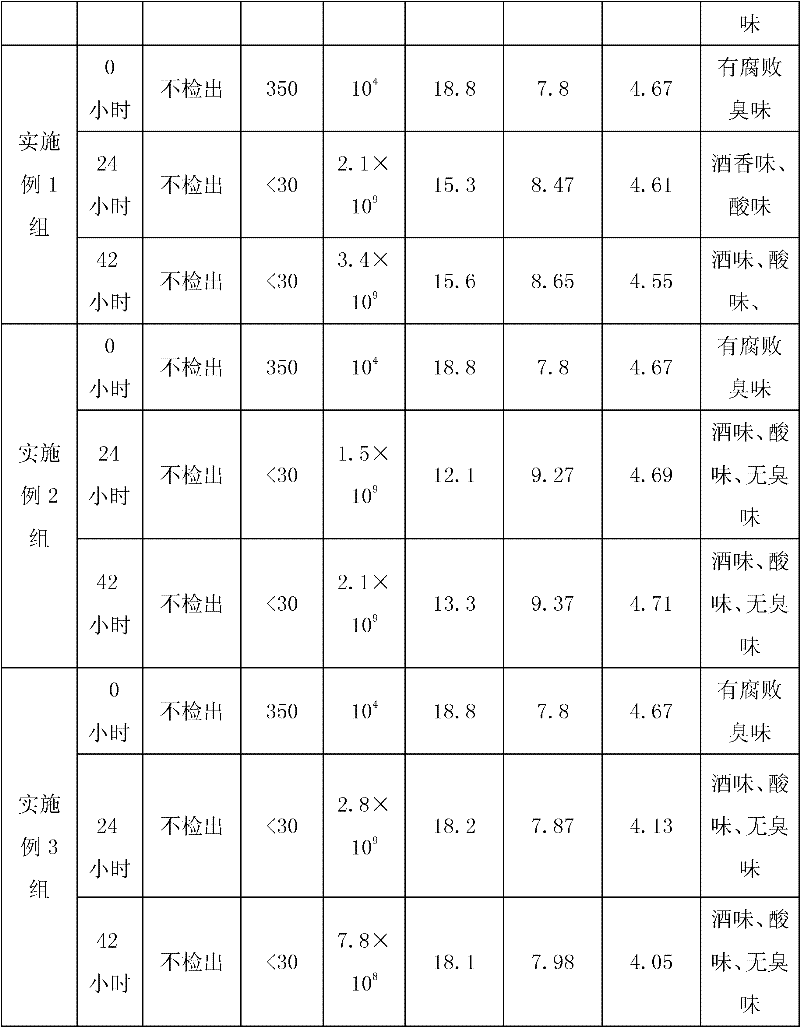Microorganism composite zymocyte agent as well as preparation method and application thereof
A technology of compound fermentation inoculants and microorganisms, applied in microorganism-based methods, biochemical equipment and methods, microorganisms, etc., can solve the problems of inconvenient collection and transportation, great impact on the quality of resource-based products, and reducing the protein content of kitchen waste. , to improve the protein content and the content of beneficial bacteria, inhibit the growth and reproduction of pathogenic microorganisms, keep fresh and have good sensory quality.
- Summary
- Abstract
- Description
- Claims
- Application Information
AI Technical Summary
Problems solved by technology
Method used
Image
Examples
Embodiment 1
[0021] The present invention is a kind of microbial compound fermentation agent, active component is Candida tropicalis (G.tropicalis) CGMCC NO.4201 and Lactococcus lactis (Lactococcus lactis) CGMCC NO.4202, Candida tropicalis liquid and Lactococcus lactis The bacterial liquid was mixed evenly according to the mass ratio of 1:1. Candida tropicalis was preserved in the China Microbial Culture Collection Management Center on September 30, 2010. The preservation number is CGMCCNO.4201, and the preservation address is Beichen, Chaoyang District, Beijing. No. 3, Yard No. 1, West Road, Institute of Microbiology, Chinese Academy of Sciences; Lactococcus lactis was preserved in the China Microorganism Culture Collection Management Center on September 30, 2010. The preservation number is CGMCC NO.4202, and the preservation address is Beijing No. 3, No. 1, Beichen West Road, Chaoyang District, Institute of Microbiology, Chinese Academy of Sciences, the preparation method is as follows: ...
Embodiment 2
[0030] The present invention is a kind of microbial composite fermentation agent, the active components are Candida tropicalis (G.tropicalis) CGMCC NO.4201 and Lactococcus lactis (Lactococcus lactis) CGMCC NO.4202, the strains of Candida tropicalis and Lactococcus lactis Mix evenly at a mass ratio of 0.5:1, and its preparation method is the same as in Example 1 above.
[0031] In this particular embodiment, the active component of the microbial compound fermentation inoculum also includes putrefaction Shewanella (Shewanella putrefacens), and the quality of this Shewanella putrefaces accounts for 25% of the compound fermentation inoculum, thereby being the bacterium of lactic acid bacteria and yeast Bacteria provide the carbon source necessary for growth.
Embodiment 3
[0033] The present invention is a kind of microbial composite fermentation agent, the active components are Candida tropicalis (G.tropicalis) CGMCC NO.4201 and Lactococcus lactis (Lactococcus lactis) CGMCC NO.4202, the strains of Candida tropicalis and Lactococcus lactis Mix evenly at a mass ratio of 2:1, and its preparation method is the same as that of Example 1 above.
[0034] In this particular embodiment, the active component of the microbial compound fermentation inoculum also includes putrefacci Shewanella (Shewanella putrefacens), and the quality of this Shewanella putrefaces accounts for 30% of the compound fermentation inoculum, thereby being a bacterium for lactic acid bacteria and yeast Bacteria provide the carbon source necessary for growth.
PUM
 Login to View More
Login to View More Abstract
Description
Claims
Application Information
 Login to View More
Login to View More - R&D
- Intellectual Property
- Life Sciences
- Materials
- Tech Scout
- Unparalleled Data Quality
- Higher Quality Content
- 60% Fewer Hallucinations
Browse by: Latest US Patents, China's latest patents, Technical Efficacy Thesaurus, Application Domain, Technology Topic, Popular Technical Reports.
© 2025 PatSnap. All rights reserved.Legal|Privacy policy|Modern Slavery Act Transparency Statement|Sitemap|About US| Contact US: help@patsnap.com


